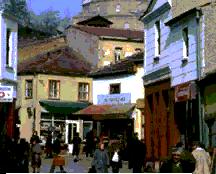 We
note that here we describe the Modern Macedonian language, the language
spoken in the Republic of Macedonia, the member of South Slavic branch
of Indo-European languages. We know that the government of Bulgaria doesn't
recognize the existence of this language supposing it is just the dialect
of Bulgarian. We know also that the Greek government doesn't recognize
the name "Macedonian" concerning this Slavic tongue, demanding another
name for it, for not to lose the glory of Ancient Macedonia. We know, finally,
that some Serbs consider Macedonian to be just a south Serbian dialect.
But the science is impassive, and the facts tells us that Macedonian is
a separate language and, as every other language, has a right to exist.
We
note that here we describe the Modern Macedonian language, the language
spoken in the Republic of Macedonia, the member of South Slavic branch
of Indo-European languages. We know that the government of Bulgaria doesn't
recognize the existence of this language supposing it is just the dialect
of Bulgarian. We know also that the Greek government doesn't recognize
the name "Macedonian" concerning this Slavic tongue, demanding another
name for it, for not to lose the glory of Ancient Macedonia. We know, finally,
that some Serbs consider Macedonian to be just a south Serbian dialect.
But the science is impassive, and the facts tells us that Macedonian is
a separate language and, as every other language, has a right to exist.
Moreover, it is very interesting. Like Bulgarian, its closest relative, Macedonian has got a definite article (due to Greek influence) placed at the end of the noun. Macedonian has got a number of features that are unique among the Slavic languages. These features include the loss of cases in nouns, adjectives and pronouns; a suffixed definite article (with three forms in Macedonian, as in the examples knigava, meaning "the book near me"; knigata, meaning "the book"; and knigana, meaning "the book over there"); and a large variety of verb tenses. The verb also has witnessed and nonwitnessed forms. Like Bulgarian and Serbian, Macedonian has a large number of borrowings from the Turkish language and a significant number from the Greek language.
Literary works have been published in Macedonian dialects since the
end of the 18th century, however, the modern literary language dates only
from August 2, 1944, when it was formally declared the language of Yugoslav
Macedonia. The language was quickly standardized in the following years.
The main dialect division in Macedonian is between eastern and western
dialects, but the dialects do not differ from each other as much as do
the dialects within the Slovenian, Serbo-Croatian,
or Bulgarian languages.